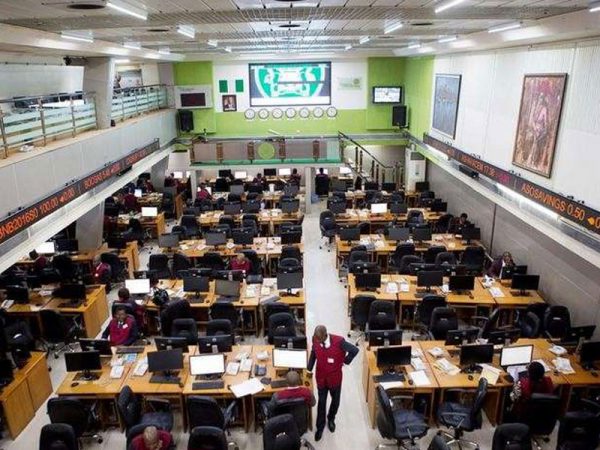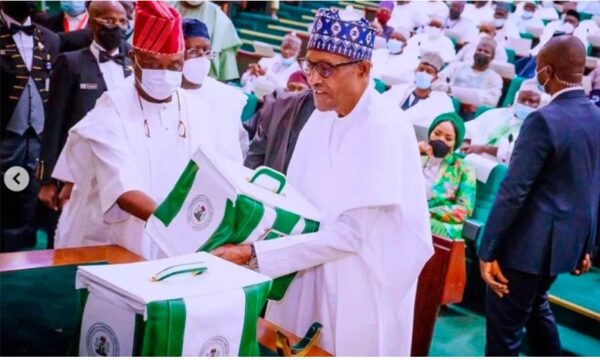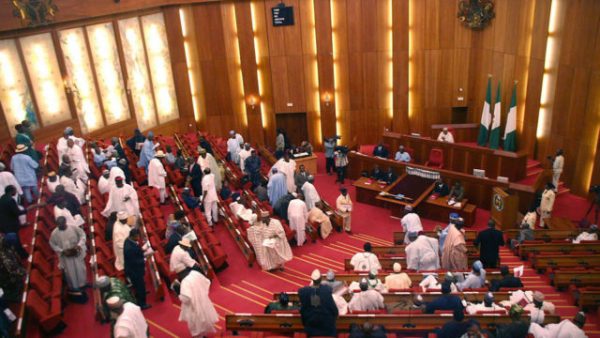Experts knock lawmakers as Reps raise budget to N17.12tn
The House of Representatives, on Tuesday, passed the 2022 Appropriation Bill, raising the total estimates of the Federal Government’s budget from the proposed N16,391,023,917,692 to N17,126,873,917,692, an increase by N735,850,000,000.
The lawmakers raised the oil benchmark from $57 per barrel to $62. They also increased the National Assembly’s budget by N5bn, from the proposed N134bn to N139bn.
The budget figures were increased amidst uncertainty in the global oil market due to the omicron variant of COVID-19.
The National Assembly had in 2020 increased its budget from N125bn to the N128bn. In 2021, the national legislature also hiked its allocation from N125bn to N133,999,950,000.
The House explained that additional revenue would be allocated to the agencies that came forward with additional report that was not captured in the budget.
These agencies include the Independent National Electoral Commission (INEC) for the 2023 election, the Federal Ministry of Works and Housing, the National Assembly (Constituency outreach), Federal Ministry of Water Resources and the National Population Commission (NPC) for the 2022 population census.
INEC had requested additional N305bn to the annual N40bn budget to execute the 2023 general elections.
Passage of the 2022 budget by the House on Tuesday followed the laying of the report by the Committee on Appropriations, consideration by the Committee of Supply and adoption by the House.
Chairman of the House Committee on Appropriations, Aliyu Betara, laid the report on the ‘Bill for an Act to authorise the issue from the Consolidated Revenue Fund of the Federation the total sum of N 17,126,873,917,692 only, of which N869,667,187,542 only is for Statutory Transfers, N3,879,952,981,550 only is for Debt Service, N6,909,849,788,737 only is for Recurrent (Non-Debt) Expenditure, while the sum of N5,467,403,959,863 only is for contribution to the Development Fund for Capital Expenditure for the year ending 31 December, 2022.”
In the budget as passed by the House, Statutory Transfers totalled N869,667,187,542; Debt Service/Sinking Fund, N3,879,952,981,550;Recurrent (Non-Debt) Expenditure, N6,909,849,788,737; Capital Expenditure, N5,467,403,959,863; Surplus/Deficit, N6,386,070,086,149.
Under Statutory Transfers of N869,667,187,542, the National Judicial Council got N120,000,000,000 as proposed; Niger Delta Development Commission, N102,783,203,366; Universal Basic Education, N112,287,014,270; National Assembly, N139,000,000,000; Public Complaints Commission, N11,190,000,000; Independent National Electoral Commission, N219,543,861,619; National Human Right Commission, N4,500,000,000; North East Development Commission, N48,076,094,017; Basic Health Care Fund, N56,143,507,135; and National Agency For Science and engineering Infrastructure, N56,143,507,135.
A breakdown of National Assembly’s N139bn budget showed that the National Assembly Office gets N19,116,017,372; Senate, N33,267,001,807; House of Representatives, N51,994,511,954; National Assembly Service Commission, N7,734,166,662; Legislatives Aides, N9,602,095,928; PAC – Senate, N118,970,215; PAC – House of representatives, N142,764,258; General Services, N8,307,475,470; National Institute for Legislative and Democratic Studies, N7,373,813,596; Service Wide Vote, N471,335,001; Office of Retired Clerks and Permanent Secretaries, N581,847,737; Appropriation Committee Department – Senate, N125,000,000; and Appropriation Committee Department – House, N165,000,000.
Apart from these, the House also approved N100bn for Zonal Intervention Projects, which are popularly referred to as constituency projects.
Other expenses relating to the National Assembly include National Assembly Library Building (Ongoing), N5bn; Hosting of Conference of Speakers’ of African Parliaments, N150m; National Assembly liabilities, N10bn; National Assembly e-Library, N300m; National Assembly Dashboard, N139m; and Constitution Review, N1bn, among others.
In the allocations approved by the House, N139bn was earmarked for the National Assembly.
But in the N16.39bn budget presented by the President, Major –General Muhammadu Buhari (retd.) to the National Assembly on October 9, N134bn was proposed for the national legislature.
In 2021, N125bn was proposed for the National Assembly and its affiliates but it was eventually raised by the lawmakers by N8,999,950,000, putting the new total estimates at N133,999,950,000.
In 2020, the National Assembly raised its budget from the proposed N125bn to the N128bn that was eventually approved.
Buhari seeks N276.8bn virement in 2021 budget, NASS approves request
The Federal Ministry of Finance, Budget and National Planning, through the President, Major General Muhammadu Buhari (retd.), sought virement in the Act
Buhari wrote to the National Assembly to vire funds totalling N276,757,232,395 to fund expenditures in the 2021 budget.
The President made the request in a letter sent to the Senate and the House, dated December 16, 2021 and titled ‘2021 Appropriation Act: Request for Virement to Fund Critical Expenditure.’
In the letter read by President of the Senate, Ahmad Lawan; and Speaker of the House, Femi Gbajabiamila, Buhari said the sum would be sourced from the N365bn Service Wide Vote for up-scaling of the National Social Investment Programme.
National Assembly elongates 2021 budget’s lifespan
Meanwhile, the Senate and the House, on Tuesday, extended the lifespan of the 2021 Appropriation Act by three months.
The Majority Leaders of the Senate and the House, Yahaya Abdullahi and Alhassan Ado-Doguwa, respectively, called for the extension of the expiration date from December 31, 2021.
Meanwhile, the House passed a budget of N215,811,290,243 for the Federal Inland Revenue Service in 2022.
As recommended by the House Committee on Finance chaired by James Faleke, the House approved issuance from the Statutory Revenue Fund of the FIRS the total sum of N215,811,290,243, out of which N119,068,000,000 only is for Personnel Cost, N60,016,000,000 only is for Overhead Cost, N35,097,000,000 only is for Capital Cost for the year ending December 31, 2022.
Budget increase not realistic, says CPPE boss, Yusuf
Experts, who commented on the budget increase, in separate interviews with The PUNCH, faulted the House.
The former Director-General of the Lagos Chamber of Commerce and Industry, Dr Muda Yusuf, said increasing the budget was not realistic at this time.
Yusuf, who is an economist and Chief Executive Officer of Centre for the Promotion of Private Enterprise, said, “It is not looking realistic. For even the original figure itself, we are still struggling on how to borrow to fund it and there is already a lot of debate around that.”
“Also, with all the effects of the pandemic and the outlook for oil price and all its assumptions, it is not looking as bright as to justify an increase in the budget.
“So it is going to be very difficult to fund the budget, for as you know the original budget is having a significant level of deficit. Now adding more to it, the assumptions and outlook globally with the Omicron and recurring variance of COVID-19 will make it extremely difficult.”
Yusuf, who served as the immediate past Director-General, Lagos Chamber of Commerce and Industry, said an expansion in the budget size might lead to greater levels of borrowing by the government.
Also, Professor of Economics at the Olabisi Onabanjo University, Ago-Iwoye, Ogun State, Prof Sheriffdeen Tella, said the legislators paid no attention to economic realities while stressing the need for a reduction in the cost of governance.
He said, “I think the legislators have their own thinking, which is not related to what the economy says. All they seem to be thinking about is how to get their own share, whether there is a shortfall or not. They seem to be oblivious to all the write-ups and suggestions regarding the budget so far. This is unfortunate.”
Spending connected to pre-election year spending – Chukwu
An economic expert and Managing Director of Cowry Asset Management Limited, Johnson Chukwu said that the development was expected as 2022 was a pre-election year and as such requires additional allocations that could cover projected spending.
He said, “In the first place one should expect that we are going to have an expansionary budget for next year, given that the year is a pre-election. So, the present government will engage in a lot of spending to improve their standing before the voting population.”







